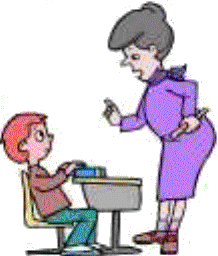Are teachers or parents responsbile for teaching kids about food?
"Timmy, repeat after me: sugar is the devil."
School is back in session. These are nervous days as many parents on my Facebook page share stories about teachers pushing kids to eat, children with food aversions being shamed and in tears, children eating in loud, crowded cafeterias with only fifteen minutes to eat etc. (Here and more school horror stories.) Then I came across this document on facebook that parents are encouraged to give to a child's teachers. I hope my daughter's teacher doesn't get one.Here's why:Point #2 says, "Parents (and only parents) should decide what their children eat. But that right does not extend to other people’s children... parents need to know their rights won’t be usurped by other parents or teachers offering food in class."Hmm, I can get behind this, particularly for younger children, and with food allergies to consider. I also agree that food shouldn't be used as a reward, and that food (or lack thereof) may impact behavior, and that there is no need for multiple celebrations that include food of any kind.However, things take a turn on page two. Teachers are encouraged to educate the children about choosing foods. "Help them do that by using age appropriate curricula, field trips, books and movies to discuss where food comes from, how it affects our bodies and why it all matters." With a list of approved resources.
???
I'm confused. Only parents decide, but teachers should end-run the parents and go straight to the kids— as long as it's approved information?Is it not possible for informed parents (or teachers for that matter) to look at the same books, videos and resources (among others) and come to different conclusions about the relative safety (of sugar for example) and desirability of foods? What if I've read the books and the research and still choose to allow my child to enjoy "junk" on occasion, free from worry that I am causing harm? What if I'm convinced in fact that banning sugar and calling food "junk" may cause more harm and make children more interested/ashamed/secretive about those forbidden foods? I'm not interested in debating these issues with this post, just suggesting that educated folks can come up with different conclusions and approaches.Furthermore, what if a family simply can't afford the local, organic, "ethical" foods that the resources espouse? What if family food traditions differ, or a family is homeless or lives far from fresh food? How parents choose (or manage) to procure foods for their families is complex and multifactorial. Public schools must acknowledge and honor these differences.
- Should a vegan teacher be free to show graphic videos (some might call propaganda) and shame children who eat meat (even grass-fed, ethically raised) or have cheese in their Bento boxes?
- What about a teacher who thinks Diet Soda is healthy and lectures our children about nutrition, telling them to stop drinking milk (dairy or soy/almond/rice substitutes) since it has "too many calories?"
- What if a teacher with an eating disorder raves about her new diet where she fasts for 48 hours because it is "healthy" and she read a study somewhere...
- Or imagine that your tween's track coach tries to get all the girls onto an "all natural herbal tea" for weight loss?
Teaching our children to feel good about food, meals and cooking, and their bodies is vitally important to many parents. However: that may look very different for me and my family than for the author of this document, or for your family— and don't we all have a right as parents (isn't it our exclusive right as the document asserts) to those different beliefs? Many of us feel upset, and protective of our children and how schools and the culture at large handles food and body image issues, but for very different reasons. As a parent, am I not allowed or entrusted to pass along my own food values, ethics, recipes and family traditions, even if they might not agree with another parent's, or the teachers' views?Mealtime Hostage mom and blogger recently commented about BMI in the schools, but I think it applies: "I wish it was the case that I could send my kids to school and know that they are somewhat insulated from all the talk of fat epidemics and toxic processed snacks and all the spin on fear about not being the perfect size and eating the perfect food. Whatever happened to reading, writing and (BMI free) arithmetic?"P.S, I would also wonder if hunger and kids skipping meals, or not having enough physical outlets isn't as much of or more of a behavior factor than some food dye and sugar (or even HFCS!) in a tube of Yogurt for most kids... (See this amazing video from teachers about hunger.)
I'd love to hear from any teachers out there. Are you encouraged to talk or teach about nutrition? Parents, what say you? Do you want your child's teachers chiming in on food? In what ways?
Making use of Forbidden Foods (Satter)
My post on how kids interpret wellness messages and my editorial on a middle ground
My proposed handout on talking to kids about food
5 Mistakes Parents Make When Educating Kids About Nutrition (raisehealthyeaters.com) I'd add teachers are not exempt based on my family's experiences and those shared by our facebook community.)

